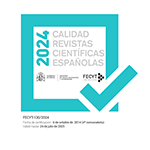Los vocativos metafóricos en las comedias de Plauto
Abstract
in the present article we approach the study of the metaphorical vocatives, those which in plautine comedy do not refer to the real identity of the listener but they attribute a metaphorical identity to him. We try to answer three questions that, in fact, construct our analysis: what forms are used? (§2), which of the speakers really creates the metaphor of the identity? (§3) and, finally, when the speakers use a metaphorical vocative, which are the motivations, the goals and the effects of this issue? (§4) Pragmatics and Conversation Analysis provide us the theoretical framework in which we find the answers to the questions above.Downloads
Article download
License
In order to support the global exchange of knowledge, the journal Cuadernos de Filología Clásica. Estudios latinos is allowing unrestricted access to its content as from its publication in this electronic edition, and as such it is an open-access journal. The originals published in this journal are the property of the Complutense University of Madrid and any reproduction thereof in full or in part must cite the source. All content is distributed under a Creative Commons Attribution 4.0 use and distribution licence (CC BY 4.0). This circumstance must be expressly stated in these terms where necessary. You can view the summary and the complete legal text of the licence.








